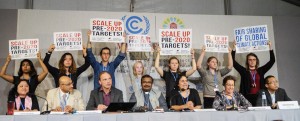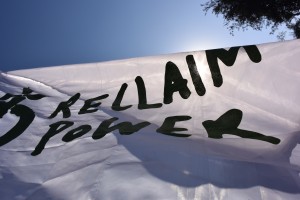The 22nd Conference of the Parties to the United Nations Framework Convention on Climate Change took place in Marrakech, Morocco, from November 7th to November 18th. In this blog post, the Earth in Brackets members who attended the conference reflect on their experiences and on the possible ways forward for the climate activist movement.

Jenna Farineau: For 22 years, the world has been coming together to talk about climate change. Governments, corporations, and civil society gather in these global spaces to figure out what the hell we should be doing about this great and terrible beast that we’ve created and no matter how knowledgeable or confident we are, our progress is glacial; our systems are glacial. We have come a long way since the beginning of these negotiations under the UNFCCC, but it’s just not where we need to be. We can talk about ambition and action all we want, but without implementation, our breath is wasted. And it’s frustrating. It’s frustrating to realize that the one place where climate change is being richly discussed without denial, is the space that is co-opted and ineffective. But I have to wonder, if this space did not exist, what would have been created in its place? After going through these past two weeks of COP 22, I desire a pivotal moment that gets us past our tortured wonder of “why” and into a phase of doing without asking, speaking frankly and straightforward, and getting over the bullshit of bureaucracy. Business as usual will only exist if we keep defining it as we do. We can no longer be delicate, we can no longer wait.
Andrea Fontana: Before leaving for this Conference, while still in Bar Harbor, I was asked to describe the UNFCCC process in one word. And the first word that came up to my mind was “unfair”. It does sadden me to not have changed my mind much from that stance. It is an unfair ground for the power dynamics, for whose voices are heard, for the priorities that are brought forward. It is unfair that in this arena most discussions revolve around deciding which word is best–or most convenient–to use rather than what is at stake: human lives. And this is why I believe that the participation of groups such ours is crucial. It is important for those that have the opportunity to speak up, to constantly remind our governments that the actions they are taken are not only inadequate, they are unjust. I am conscious of the fact that we can neither influence much that goes on paper nor write the decisions made here. But I also believe in the fact that we can raise our voice and be heard and, in the bigger scheme of things, bring some justice to this process.
Margherita Tommasini: If last year, with the COP in Paris, I have been hinted at it, here in Marrakesh I fully understood that the equitable and ambitious measures that we need in order to tackle climate change will not be delivered by these multilateral negotiations. I leave Morocco saddened by the lack of initiative demonstrated by those in power, but encouraged by the actions and the plans of the civil society. As we sung in the last action, which took place during the closing plenary: “Hey COP 22, we are here to talk to you! Will you hear the people’s call? 1.5 or we all fall! We will lay our bodies down! We will keep it in the ground. We won’t stop until we are done! we will fight until we have won!”
Rachael Goldberg: Yesterday I was asked to describe the past two weeks in one word. I’m notorious for being quite indecisive but on this occasion one word came to my mind immediately: urgency. Last year we emitted 40 gigaton of carbon dioxide. In order to maybe stay under 1.5 degrees of warming we only have a carbon budget of 200 gigatons left. That means that if we continue to emit at the current rate we will have warmed our earth 1.5 degrees Celsius in the next five years. Five years. With a five year timeline we don’t have time to wait for the Paris Agreement to “start being implemented” in 2020 or for Donald Trump to be out of office in four years. The urgency of the situation demands us to be active immediately. It’s an overwhelming thought considering how little action we just witnessed during COP 22, but, if this huge international conference has shown me anything it’s proven to me how powerful grassroots movements, people and civil society are. Going forward we need everyone, the singers, shouters, organizers, followers, leaders, writers, dancers, everyone. We need to be on the ground, at fossil fuel construction projects, and in the streets, demanding a just transition away from fossil fuels to renewable energy. When I envision success I imagine a child who wants something. They make noise, nag, yell and get in everyones hair until they get what they want. We need to take these lessons and build a global community of based on persistence and reliability.
Laura Berry: My experience at COP 22 has only reaffirmed within me what I already knew to be true — that real progress on issues of environmental justice is made by real people in real communities, not negotiators who speak only for the interests of governments and corporations, no matter how targeted the action or clear our messaging. Yes, international policymaking has been an important space for codifying environmental protection worldwide, but treaties like the UNFCCC and the Paris Agreement themselves don’t represent progress, they’re simply tools used to try to influence national policies within a complex world of international politics. But we already know that even with the pledges made by nations through the Paris Agreement that the world will see global temperature rise by more than 3C, and we can’t wait any longer to for governments to take real action. Only through a globally networked movement of local grassroots initiatives and civil society efforts can we fight against the fossil fuel industry and unjust economic system that created the climate crisis, and work together build the equitable and sustainable world that we need.
Sara Velander: After attending three consecutive COPs now, I have arrived to the conclusion that not much has changed in this process no matter how much we try to influence it from within, whether it’s through actions, policy tracking, or lobbying negotiators. COP 22 made this realization ever more clear to me with its failure to advance any substantive negotiations on the Paris Agreement. What will continue the next few years is more inaction, procrastination, and greenwashing by the powerful upper class, inadvertently marginalizing the “powerless”. But I have not lost hope in the civil society that represent these “powerless” communities in international UN spaces. At COP 22 civil society united justice struggles, collaborated on rights-based solutions to climate change, and continued the fight against dirty industry – this is the actual outcome of COP 22, because as much as these spaces restrict voices of the marginalized, it also provides a space for new alliances to take shape that hold the truly sustainable and just solutions to climate change, that aren’t dependent on a corrupt, ineffective process like the UNFCCC .

Until next year, COP23. And in the meantime, join us in the streets and on the frontlines.
